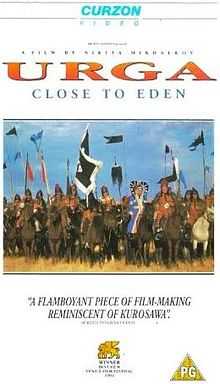Close to Eden
| Urga Close to Eden | |
|---|---|
 | |
| Directed by | Nikita Mikhalkov |
| Produced by |
Michel Seydoux Jean-Louis Piel René Cleitman |
| Written by |
Rustam Ibragimbekov Nikita Mikhalkov |
| Starring |
Bayaertu Badema Vladimir Gostyukhin |
| Music by | Eduard Artemyev |
| Cinematography | Vilen Kalyuta |
| Editing by | Joëlle Hache |
| Distributed by |
Miramax Films (US) Curzon Video (UK) |
| Release dates | 1991 |
| Running time |
109 mins (US VHS) 114 mins (UK VHS) 118 mins (Russia) |
| Country | Soviet Union |
| Language | Mongolian / Russian / Mandarin |
Urga is a 1991 film by Russian director Nikita Mikhalkov. It is released in North America as Close to Eden. It depicts the friendship between a Russian truck driver and a Mongolian shepherd in Inner Mongolia. The film was an international co-production between companies based in Russia and France.
Plot
The Mongolian shepherd Gombo lives in a yurt in Inner Mongolia with his wife, three children, and mother. They are content with their uncomplicated rural lives but Gombo wants to go on having sex with his wife, while she refuses for fear of having a fourth child, which is against Chinese law. A Russian truck driver named Sergei is stranded nearby and finds his way to their yurt, where he and Gombo become friends despite their language and cultural differences. Gombo and Sergei go into the nearest city together, where Gombo is supposed to buy contraceptives (condoms). He buys a television set and other goods, but backs out of buying contraceptives after discovering that all the staff at the drugstore are women. Sergei, a former army bandsman, becomes drunk and sings "On the Hills of Manchuria" in a nightclub, with the band playing from sheet music tattooed on his back. He is arrested and bailed out of jail by Gombo.
Gombo returns home, and along the way stops to eat. He has a strange dream featuring his drunken, horse-riding relative as Genghis Khan and his wife as the Khan's wife. In the dream both he and Sergei are captured and killed and the TV set is destroyed. Gombo awakes from his dream and arrives home with the TV. He and his family switch between watching a broadcast of the President of the US and a badly sung variety show. Gombo's wife, upset that he didn't buy contraceptives, leaves the yurt. Gombo follows her out onto the prairie, sticking an urga (a long stick with a lasso on the end used to capture animals) into the ground in a traditional warning that a couple is being intimate. A voiceover from Gombo's fourth son, who was conceived at this time, concludes the film, and a chimney belching smoke stands where Gombo placed his urga.
Awards
Urga won the Golden Lion at the Venice Film Festival and Best European Film at the European Film Awards. It was also nominated for an Academy Award for Best Foreign Film, and for a Golden Globe in the same category.
Influence
The film is credited with sparking Czech writer Petra Hůlová's initial interest in Mongolia, leading to study, then an exchange year in Ulan Bator, and then to her first novel, Paměť mojí babičce (2002; literally "in memory of my grandmother"), in English translation published as All This Belongs to Me (2009, Northwestern University Press).[1]
References
- ↑ Allen, Lisette, "Telling a foreign tale in a foreign tongue", Prague Post, September 30, 2009. Retrieved 2011-06-27.
External links
- Urga at allmovie
- Urga at the Internet Movie Database
| Awards | ||
|---|---|---|
| Preceded by Stolen Children |
European Film Award for Best European Film 1993 |
Succeeded by Lamerica |
| |||||
| |||||